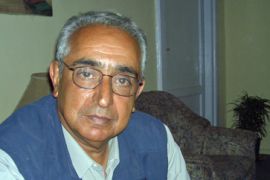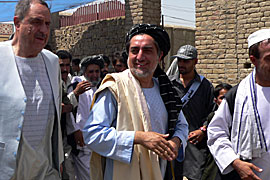Afghan royal eyes poll success
Will former royal emerge as a key player in Afghanistan’s presidential election?

 |
| Zahir Shah, left, the late former Afghan king, proposed the establishment of an emergency Loya Jirga – or national assembly – following the US-led invasion of Afghanistan in 2001 [EPA] |
Abducted by armed assailants from his home in Kabul last October, 69-year-old Homayoun Shah Assefi was held captive for a week before being rescued by Afghan police.
Before an investigation revealed that his assailants were merely thugs hoping for a hefty ransom, many in Kabul were speculating why he had been targeted.
| special report | ||
|
As the brother of the late Queen of Afghanistan, and a cousin of the late King Zahir Shah, some felt Assefi might have been scapegoated by a fringe group that resented the former ruling family.
Keep reading
list of 4 itemsPalestinian Prisoner’s Day: How many are still in Israeli detention?
‘Mama we’re dying’: Only able to hear her kids in Gaza in their final days
Europe pledges to boost aid to Sudan on unwelcome war anniversary
But there was also talk that it might have been for political reasons.
Assefi is known to have been critical of the current government as well as slain Afghan mujahideen leader Ahmad Shah Massoud, the so-called Lion of Panjshir [valley], who remains an iconic figurehead of the Tajiks of Afghanistan.
On August 20, Assefi will be running as first vice president on the ticket of a leading contender for the top job, Abdullah Abdullah.
Royal makeover
It may appear to be an unlikely pairing – Abdullah, a former foreign minister, is a key member of the mostly Tajik Northern Alliance faction – also known as Panjshiri.
But sources speculate that it is also a bid to prove that Assefi can reinvent himself on the political scene in a way that other former royals have so far failed to do.
Not even the famously ambitious Mustapha Zaher, a grandson of the former king and a former Afghan ambassador to Italy, who later moved up to head the country’s Environmental Protection Agency, has succeeded in emerging as a powerful player.
|
“The UN and the Americans saw the Northern Alliance as their main interlocutor, but needed the legitimacy and the broad national acceptance that only Zahir Shah’s name could bring” Helena Malikyar, expert on the history of Afghan state building |
After 28 years of exile in Rome, the former king was propelled back into the limelight after the US-led invasion to oust the Taliban in 2001.
In 2001, Zahir Shah proposed an emergency Loya Jirga, or national assembly, which was used as a framework for the Bonn Agreement that paved the way for the establishment of a post-Taliban government.
He endorsed the candidacy of the former mujahideen Hamid Karzai as president, and was then given the honorific title “father of the nation”, before being forsaken by the US government and left to live out the rest of his years in the heavily fortified and isolated Arg Presidential Palace.
“Simply put, whatever criticism there is on the details of the Bonn Agreement, without His Majesty Zahir Shah, the accord would not have happened,” says Helena Malikyar, an expert on the history of state building in Afghanistan.
King turned king-maker
“The UN and the Americans saw the Northern Alliance as their main interlocutor, but needed the legitimacy and the broad national acceptance that only Zahir Shah’s name could bring to the new regime,” Malikyar, who also worked on Zahir Shah’s emergency Loya Jirga initiative in 2001, says.
She points out that when the emergency Loya Jirga was eventually convened in Kabul in June 2002, it was said that approximately 90 per cent of the nation’s delegates were going to vote for the restoration of monarchy under Zahir Shah.
Many believe that the former king then announced his lack of interest in holding executive power and proposed Karzai as his choice for the job as a result of considerable international pressure.
“The king, thus, became the king maker,” notes Malikyar.
During his bid for the presidency in 2004, Assefi had reportedly requested – and received – the former king’s permission to run but, at the eleventh hour, Zahir Shah’s office issued a statement endorsing Karzai.
“I think the king essentially approved of any-body’s candidacy because he thought it was a healthy exercise to have challengers in the race,” says Malikyar.
Until his death in August 2007, the former king continued to provide Karzai with political legitimacy and a power base that the latter had lacked.
It is a privilege that members of the former king’s own family were never bestowed.
It was only after the death of the former king that other ex-royals with the desire to become political players entered the fray full force.
But political observers say the former royals will have to rely more on their own leadership skills than the late king’s good reputation.
Pashtun vote
 |
| Assefi’s performance at the polls will be seen as a measure of the former royals’ popularity |
Abdullah, whose core support base is still among the non-Pashtun elite, hopes that having Assefi as a running mate will bring in some Pashtun votes.
Ahmad Wali Massoud, who is Abdullah’s campaign strategist and head of his board of policy, stresses Assefi’s strengths: “He is a good man, a respected personality. He was not chosen because he is a member of the former royal family. He was chosen because he is an intellectual and he is qualified for the position.”
Massoud, a younger brother of slain mujahideen leader Ahmad Shah Massoud, dismisses as irrelevant Assefi’s royal lineage, but not his Pashtun ethnicity.
“For the Pashtuns, having a Pashtun in government is more important than the qualifications of the man. But Homayoun Shah Assefi is not just a Pashtun. He is an academic and an honest man,” he says.
Why Assefi has chosen to run with the ophthalmologist-cum-politician remains a moot point.
Bucking the trend
In the past few years, the former royal family has mainly supported the incumbent.
Some members of the former royal family have so fiercely campaigned for Karzai that Afghans now joke that the president’s election campaign headquarters are in the Haram Saray, the part of the presidential palace where the royal family resides.
Even the former king’s “renegade grandson” Mustapha – who has over the years been courted by the Panjshiri faction – is thought to be backing Karzai.
Additionally, Abdul Ali Seraj, a nephew of King Amanullah who ruled between 1919 and 1929 – abandoned his own presidential bid in favour of Karzai.
The endorsement for the incumbent president reportedly came in exchange for Karzai’s pledge to address the needs of Seraj’s constituents.
But Nadir Naim, a grandson of Zahir Shah, denies that tribal considerations have influenced the family to favour one candidate over another.
“There has existed a strong principal and indoctrination from our elders to look at all Afghans as equals and not to favour one tribe over another,” says Naim, who returned to Afghanistan in 2002 after 25 years of exile in the UK to serve as Zahir Shah’s private secretary.
“I think we – especially members of my family – need to look at who would be a better leader for the next five years in Afghanistan.”
Federal government?
 |
| Abdullah, centre, wants to move from a presidential to a parliamentary system [AFP] |
Malikyar, who has worked in Afghanistan since 2001 as a consultant on various governance projects, stresses that the Karzai-Abdullah dichotomy “goes beyond ethnic and tribal issues”.
“Abdullah has made changing the governance – from presidential to a parliamentary system – the top issue of his campaign. He has also hinted in favour of a change in the state structure, from unitary to a decentralised, possibly federal arrangement,” she says.
“Assefi was opposed to such fundamental changes during his 2004 [presidential] campaign. So, whether this alliance is based on a shared pragmatic vision or sheer political expediency remains to be seen.”
Massoud, however, believes Assefi is committed to the principles of Abdullah’s programme for Afghanistan.
“I don’t know what Assefi’s platform was during his 2004 presidential bid, but he and Abdullah are very much in sync insofar as their vision for Afghanistan, to bring change and restore hope. He agrees that we need a parliamentary system in Afghanistan, and decentralisation of power,” Massoud says.
Royal roots
Assefi holds a degree in international relations from a French university. He served in the Afghan foreign ministry from 1973 but, following the communist coup d’etat in 1978, he sought political asylum in France.
In 2002, he was finally able to return to Afghanistan and served as a member of the emergency Loya Jirga. In 2003, he was one of the founders and an executive member of the Tahrik Wahdat Milli of Afghanistan Party – the Movement for National Unity of Afghanistan.
However, one question remains: to what extent does the local population still revere the royal family?
Malikyar believes that elections results will reveal the emergence of trans-tribal and trans-ethnic loyalties.
This would indicate that despite the systematic marginalisation of the former king and his family, politically ambitious royals may soon be able to “bank on the former king’s legacy as a truly national leader”.
